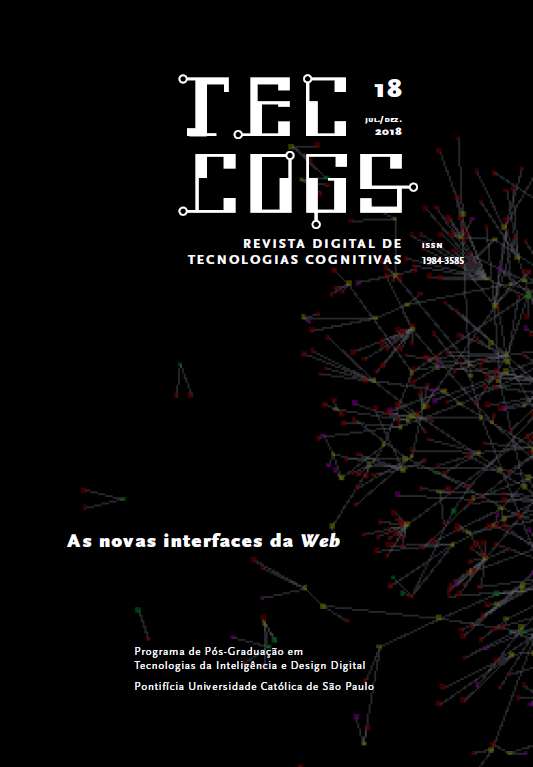O pensamento computacional como estratégia de aprendizagem, autoria digital e construção da cidadania
DOI:
https://doi.org/10.23925/1984-3585.2018i18p94-109Palavras-chave:
Pensamento computacional, Autoria digital, Cidadania, Estratégia de aprendizagemResumo
O pensamento computacional na escola favorece a revisão das próprias produções, considerando-as produtos sempre em processo. A proposta do artigo é de instigar o leitor a entrar em contato com uma visão de estratégia de aprendizagem, autoria digital e construção da cidadania que assume a função de estabelecer ligações junto ao professor e aluno, em um movimento que implica compreender o paradigma do pensamento computacional e o desenvolvimento de atividades que priorize o pensamento crítico e a reflexão. Objetiva ainda discutir a produção de artefatos alicerçada pelo processo de autoria digital, de modo que os alunos assumam a responsabilidade sobre o seu próprio processo de aprendizagem, adquirindo competências que lhes permitam continuar aprendendo ao longo da vida.
Referências
BRENNAN, K., RESNICK, M. New frameworks for studying and assessing the development of computational thinking. Artigo apresentado no American Educational Research Association Annual Meeting, Vancouver, Canadá, 2012.
BURKE, Brian. Gamificar: como a gamificação motiva as pessoas a fazerem coisas extraordinárias. São Paulo: Dvs, 2015.
DORLING, M.; WALKER, M. Computing progression pathways, 2014. Disponível em: hoddereducation.co.uk/Subjects/ICT/Series-pages/ Compute-IT/Series-Box/Progression-Pathways/Progression-Pathways- Grid.aspx. Acesso em: 28 out. 2018.
DORLING, M.; SELBY, C.; WOOLLARD, J. Evidence of assessing computational thinking. IfIP 2015, A new culture of learning: computing and next generations. Vilnius, Lituânia. Disponível em: eprints.soton. ac.uk/377856. Acesso em: 01 nov. 2018.
KAFAI, Yasmin B.; PEPPLER, Kylie A.; CHAPMAN, Robbin (orgs.). The computer clubhouse. Nova Iorque: Teachers’ College Press, 2009.
LOPES, Rose (org.). Educação empreendedora: conceitos, modelos e práticas. Rio de Janeiro: Elsevier, 2010.
MCGONIGAL, Jane. A realidade em jogo: por que os games nos tornam melhores e como eles podem mudar o mundo. Rio de Janeiro: BestSeller, 2012.
OKADA, A.; MIKROYANNIDIS, A.; MEISTER, I.; LITTLE, S. Coaprendizagem através de REA e Redes Sociais. In: OKADA, A. Open educational resources and social networks: co-learning and professional development. Londres: Scholio Educational Research & Publishing, 2012. Disponível em: oer.kmi.open.ac.uk/?page_id=1479. Acesso em: 04 dez. 2018.
RICARDO, Eleonora Jorge. Educação a distância: professores-autores em tempos de cibercultura. São Paulo: Atlas, 2013.
SANTAELLA, Lucia. Comunicação ubíqua: repercussões na cultura e na educação. São Paulo: Paulus, 2013.
SELBY, C.; WOOLLARD, J. Computational thinking: the developing definition, 2013. Disponível em: eprints.soton.ac.uk/356481. Acesso em: 04 nov. 2018.
WAISELFISZ, Julio Jacobo. Lápis, borracha e teclado: tecnologia da informação na educação. Brasília: Rede de Informação Tecnológica Latino-americana (RITlA), 2007.
WING, J. Computational thinking. Communications of the acm, v. 49, n. 3, 2006, p. 33-35. Disponível em: dl.acm.org/citation.cfm?id=1118215.
Acesso em: 04 nov. 2018.
WING, J. Research notebook: computational thinking – what and why? The link. Pittsburgh: Carnegie Mellon, 2011. Disponível em: cs.cmu. edu/sites/default/files/11-399_The_Link_Newsletter-3.pdf. Acesso em: 04 nov. 2018.
Downloads
Publicado
Como Citar
Edição
Seção
Licença
Copyright (c) 2018 Claudio F. André

Este trabalho está licenciado sob uma licença Creative Commons Attribution 4.0 International License.
Esta revista oferece acesso livre imediato ao seu conteúdo de acordo com a licença CC BY 4.0, em conformidade com a definição de acesso público do Directory of Open Access Journals (DOAJ).
Ao submeter um texto à TECCOGS, os autores asseguram que o material submetido à avaliação e eventual publicação não infringe de modo algum qualquer direito proprietário ou copyright de outros. Com a submissão, o autor transfere em efetivo os direitos de publicação do artigo para a TECCOGS. A transferência de copyright cobre os direitos exclusivos de publicação e distribuição do artigo, incluindo reimpressões ou quaisquer outras reproduções de natureza similar, além de traduções. Os autores mantém o direito de usar todo ou partes deste texto em trabalhos futuros de sua autoria e de conceder ou recusar a permissão a terceiros para republicar todo ou partes do texto ou de suas traduções. Para republicar números da revista na íntegra, qualquer interessado precisa obter permissão por escrito tanto dos autores como também dos editores da TECCOGS. A TECCOGS por si só pode conceder direitos relativos a emissões de periódicos como um todo.
Imagens com direitos autorais pertencentes a terceiros, que não foram concedidos ao autor do texto, devem ser utilizadas somente quando necessárias à análise e ao argumento da pesquisa, sempre indicando as respectivas fontes e autoria. A TECCOGS dispensa o uso de imagens meramente ilustrativas. Se desejar ilustrar um conceito, o autor deve indicar, em forma de URL ou referência bibliográfica, uma referência em que a ilustração esteja disponível.
---------------------------------------------------------------------------------
This journal offers free immediate access to its content under CC BY 4.0, in accordance with Directory of Open Access Journals' (DOAJ) definition of Open Acess.
When submitting a text to TECCOGS, authors ensure that the material submitted for evaluation and eventual publication does not infringe any proprietary right or copyright. Upon submission, authors effectively transfer the publication rights of the article to TECCOGS. The copyright transfer covers the exclusive rights of publication and distribution of the article, including reprints or any other reproduction of similar nature, in addition to translations. Authors retain the right to use all or parts of the text in future works of their own, as well as to grant or refuse permission to third parties to republish all or parts of the text or its translations. In order to fully republish issues of the magazine, anyone interested must obtain written permission from both the authors and the editors of TECCOGS. TECCOGS alone can grant rights relating to issues of journals as a whole.
Images whose copyright belongs to third parties that have not been granted to the author of the text should be used only when essential for the analysis and argument, always indicating theirs respective sources and authorship. TECCOGS dismisses any use of merely illustrative images. To illustrate a concept, the author must indicate, in the form of a URL or bibliographic reference, a source in which the illustration is available.


